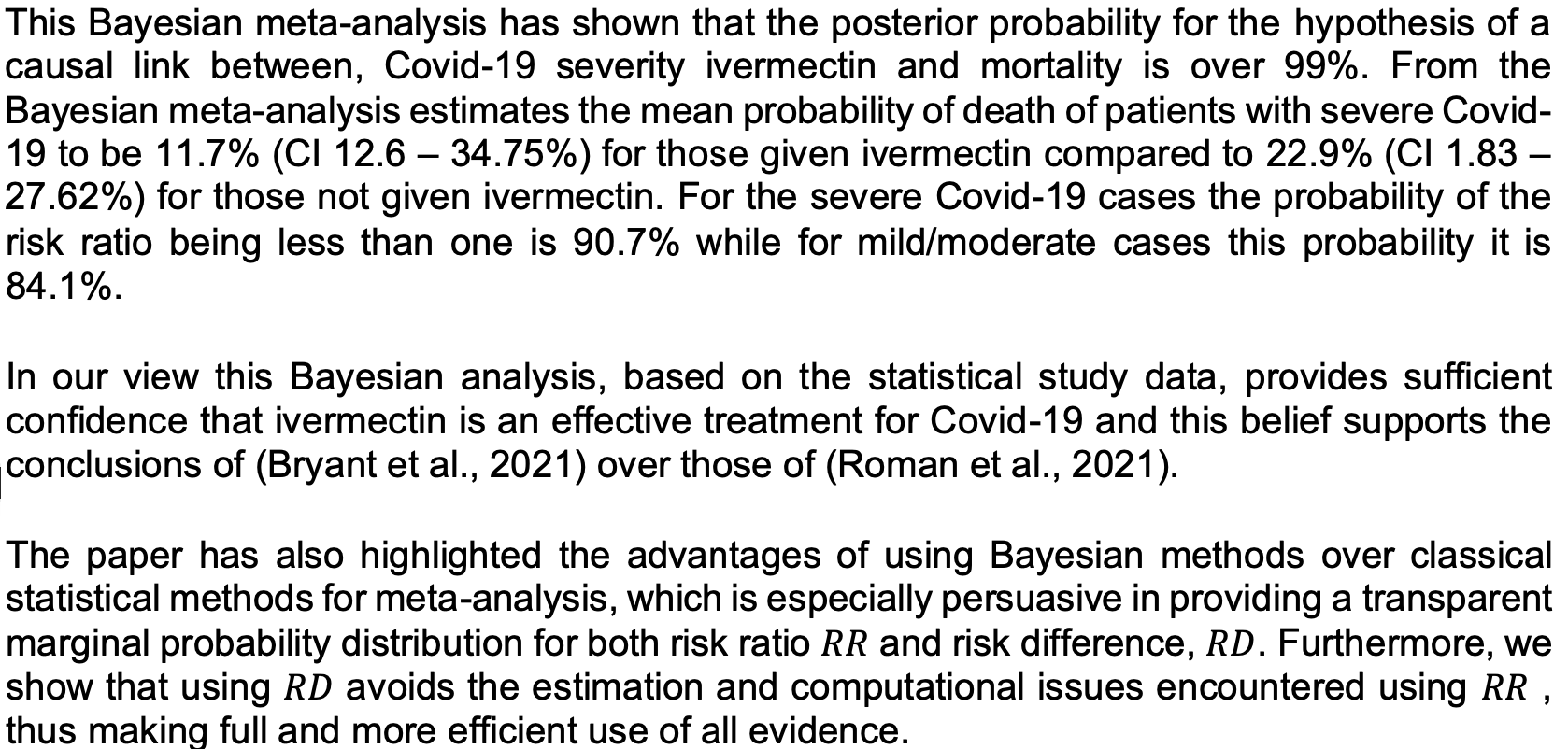Bayesian Meta Analysis of Ivermectin Effectiveness in Treating Covid-19 Disease
Martin Neil, Norman Fenton
doi:10.13140/RG.2.2.31800.88323
A recent peer reviewed meta-analysis evaluating ivermectin (Bryant et al, 2021) concluded that this antiparasitic drug is a cheap and effective treatment for reducing Covid-19 deaths. These conclusions were in stark contrast to those of a later study (Roman et al, 2021) . Although (Roman et al, 2021) applied the same classical statistical approach to meta-analysis, and produced similar results based on a subset of the same trials data used by (Bryant et al), they claimed there was insufficient quality of evidence to support the conclusion Ivermectin was effective. This paper applies a Bayesian approach, to a subset of the same trial data, to test several causal hypotheses linking Covid-19 severity and ivermectin to mortality and produce an alternative analysis to the classical approach. Applying diverse alternative analysis methods which reach the same conclusions should increase overall confidence in the result. We show that there is overwhelming evidence to support a causal link between ivermectin, Covid-19 severity and mortality, and: i) for severe Covid-19 there is a 90.7% probability the risk ratio favours ivermectin; ii) for mild/moderate Covid-19 there is an 84.1% probability the risk ratio favours ivermectin. Also, from the Bayesian meta-analysis for patients with severe Covid-19, the mean probability of death without ivermectin treatment is 22.9%, whilst with the application of ivermectin treatment it is 11.7%. The paper also highlights advantages of using Bayesian methods over classical statistical methods for meta-analysis.
Appendix The stages in the analysis are organised as follows: A. Learn the mortality probability distribution from relevant trials for each hypothesis of concern using a Beta-Binomial hierarchical model. B. For each causal hypothesis use the model in stage A to learn the mortality probability distributions relevant to that causal hypothesis. C. For each causal hypothesis use the learnt probability distributions from stage B to predict the observed data and calculate the likelihood of observing that data. D. all causal hypotheses compute the posterior probability of each hypothesis given the likelihood of observing the data under hypothesis and select the most likely causal hypothesis that explains the data. E. Estimate the magnitude of impact of the relevant variables, under that hypothesis, on mortality. For each hypothesis and combination of Covid-19 severity and treatment variable state we learn the corresponding mortality probability distribution using a hierarchical Beta-Binomial model (where 𝑚 is the number of studies, 𝑛 𝑖 is the number of patients and 𝑥 𝑖 is the number of deaths in study 𝑖): 𝛼, 𝛽 ~𝑈𝑛𝑖𝑓𝑜𝑟𝑚(0,100) where the mortality probability, 𝑝, is determined by two parameters, 𝛼 and 𝛽 that model the global distribution of 𝑝 𝑖 variables across the studies, where each 𝑝 𝑖 is determined by its local data (𝑛 𝑖 , 𝑥 𝑖 ). An example of the structure of the Bayesian model used in steps A to C is shown in Figure 4 , as a Bayesian Network, where we learn the probability..
References
Crawford, Fenton, The Meta-Analytical Fixers: An Ivermectin Tale
Fordham, Lawrie, Attempt to discredit landmark British ivermectin study
Ltd, Bryant, Lawrie, Dowswell, Fordham et al., Ivermectin for Prevention and Treatment of COVID-19 Infection: A Systematic Review, Meta-analysis, and Trial Sequential Analysis to Inform Clinical Guidelines, American Journal of Therapeutics,
doi:10.1097/MJT.0000000000001402Roman, Burela, Pasupuleti, Piscoya, Vidal et al., Ivermectin for the treatment of COVID-19: A systematic review and meta-analysis of randomized controlled trials, MedRxiv,
doi:10.1101/2021.05.21.21257595DOI record:
{
"DOI": "10.13140/RG.2.2.31800.88323",
"URL": "http://rgdoi.net/10.13140/RG.2.2.31800.88323",
"author": [
{
"family": "Neil",
"given": "Martin"
},
{
"family": "Fenton",
"given": "Norman"
}
],
"container-title": "Unpublished",
"id": "https://doi.org/10.13140/rg.2.2.31800.88323",
"issued": {
"date-parts": [
[
2021
]
]
},
"language": "en",
"publisher": "Unpublished",
"title": "Bayesian Meta Analysis of Ivermectin Effectiveness in Treating Covid-19 Disease",
"type": "article-journal"
}
